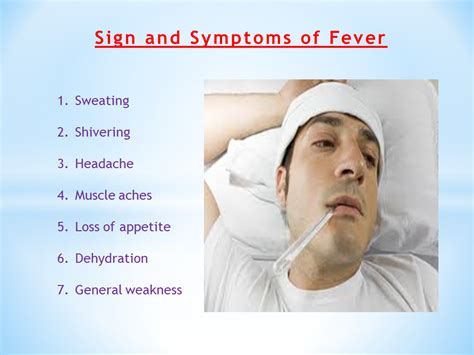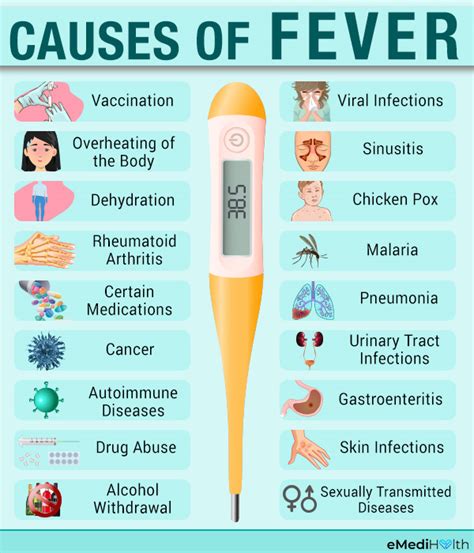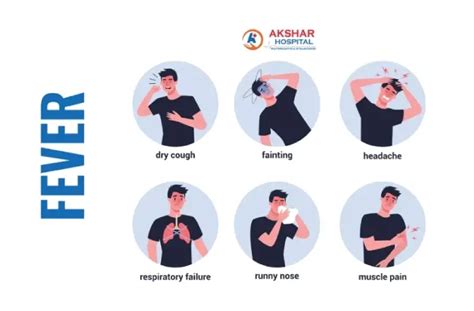Intro
Learn about fever in adults, including causes, symptoms, and treatments. Understand high temperature, infections, and when to seek medical help for a feverish condition, viral or bacterial infections, and flu-like symptoms.
Fever is a common symptom that can affect anyone, regardless of age or health status. In adults, fever can be caused by a variety of factors, including infections, inflammation, and other medical conditions. Understanding the causes, symptoms, and treatment options for fever in adults is essential for maintaining good health and preventing complications.
When an adult develops a fever, it can be a sign that their body is fighting off an infection or other underlying condition. Fever can be accompanied by other symptoms such as headache, muscle aches, and fatigue, which can make it difficult to perform daily activities. In some cases, fever can be a sign of a more serious condition, such as pneumonia or sepsis, which requires prompt medical attention.
It's essential to recognize the signs and symptoms of fever in adults and seek medical attention if necessary. By understanding the causes and treatment options for fever, adults can take steps to manage their symptoms, prevent complications, and maintain good health. In this article, we'll delve into the world of fever in adults, exploring the causes, symptoms, treatment options, and prevention strategies.
Causes of Fever in Adults

- Viral infections such as the flu, common cold, or mononucleosis
- Bacterial infections such as pneumonia, tuberculosis, or sepsis
- Inflammatory conditions such as arthritis, lupus, or Crohn's disease
- Cancer or lymphoma
- Medications or vaccinations
- Exposure to toxins or environmental pollutants
It's essential to identify the underlying cause of fever in adults to provide effective treatment and prevent complications.
Symptoms of Fever in Adults

- Elevated body temperature (usually above 100.4°F)
- Chills or sweating
- Headache or muscle aches
- Fatigue or weakness
- Loss of appetite or nausea
- Cough or sore throat
- Diarrhea or vomiting
In some cases, fever can be accompanied by more severe symptoms, such as:
- Seizures or convulsions
- Confusion or disorientation
- Difficulty breathing or rapid heartbeat
- Severe headache or stiff neck
- Rash or skin lesions
If you're experiencing any of these symptoms, it's essential to seek medical attention promptly.
Diagnosis of Fever in Adults

- Physical examination: Your doctor will perform a physical examination to look for signs of infection or inflammation.
- Medical history: Your doctor will ask about your medical history, including any recent illnesses or exposures.
- Laboratory tests: Your doctor may order laboratory tests, such as blood tests or urine tests, to identify the underlying cause of fever.
- Imaging tests: Your doctor may order imaging tests, such as X-rays or CT scans, to visualize the affected area.
By combining these methods, your doctor can determine the underlying cause of fever and develop an effective treatment plan.
Treatment of Fever in Adults

- Antibiotics: If the cause of fever is a bacterial infection, your doctor may prescribe antibiotics to help clear the infection.
- Antiviral medications: If the cause of fever is a viral infection, your doctor may prescribe antiviral medications to help manage symptoms.
- Anti-inflammatory medications: If the cause of fever is an inflammatory condition, your doctor may prescribe anti-inflammatory medications to help reduce inflammation.
- Supportive care: In some cases, treatment may involve supportive care, such as rest, hydration, and pain management.
It's essential to follow your doctor's treatment plan to ensure effective management of fever and prevent complications.
Prevention of Fever in Adults

- Practicing good hygiene: Washing your hands regularly, avoiding close contact with people who are sick, and avoiding sharing personal items can help prevent the spread of infections.
- Getting vaccinated: Getting vaccinated against common infections, such as the flu or pneumonia, can help prevent fever.
- Maintaining a healthy lifestyle: Eating a balanced diet, exercising regularly, and getting enough sleep can help boost your immune system and prevent fever.
- Avoiding exposure to toxins: Avoiding exposure to toxins, such as environmental pollutants or certain chemicals, can help prevent fever.
By following these tips, you can reduce your risk of developing fever and maintain good health.
Additional Tips for Managing Fever
Some additional tips for managing fever include:- Staying hydrated: Drinking plenty of fluids, such as water or electrolyte-rich beverages, can help manage fever and prevent dehydration.
- Resting: Getting plenty of rest can help your body recover from illness and manage fever.
- Using a cool compress: Applying a cool compress to your forehead or neck can help reduce fever and relieve symptoms.
- Avoiding overexertion: Avoiding overexertion and taking regular breaks can help manage fever and prevent complications.
By following these tips, you can effectively manage fever and prevent complications.
What is the normal body temperature for adults?
+Normal body temperature for adults is typically around 98.6°F (37°C), but it can vary slightly from person to person.
What are the most common causes of fever in adults?
+The most common causes of fever in adults include viral infections, bacterial infections, inflammatory conditions, and cancer or lymphoma.
How can I prevent fever in adults?
+Preventing fever in adults requires a combination of good hygiene practices, healthy lifestyle habits, and regular medical check-ups. Practicing good hygiene, getting vaccinated, maintaining a healthy lifestyle, and avoiding exposure to toxins can help prevent fever.
If you've made it this far, congratulations! You now have a comprehensive understanding of fever in adults, including the causes, symptoms, treatment options, and prevention strategies. We hope you found this article informative and helpful. If you have any questions or comments, please don't hesitate to reach out. Share this article with your friends and family to help spread awareness about fever in adults. By working together, we can promote good health and prevent complications.
